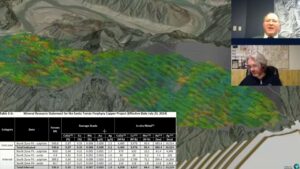Vancouver, British Columbia — Silver Bull Resources, Inc. (TSX: SVB, NYSE MKT: SVBL) (“Silver Bull”) is pleased to announce the drill results for the tenth batch of drill holes from the underground drill program twinning a series of “long holes” in a high grade silver zone situated at the eastern end of the Shallow Silver Zone on the Sierra Mojada Project in Coahuila, Northern Mexico.
High grade silver highlights from the tenth batch of 15 drill holes include:
- Hole T12093: 18 meters @ 178.19g/t Ag (including 7.6m @ 291.26g/t Ag)
- Hole T12094: 5.10 meters @ 118.61g/t Ag (including 1m @ 477g/t Ag)
- Hole T12095: 3.30 meters @ 125.30g/t Ag, 6.97% Zn, 0.24% Cu and 2.53% Pb
- Hole T12096: 13.75 meters @ 95.72g/t Ag (including 2m @ 321.7g/t Ag)
- Hole T12111: 4.05 meters @ 264.50g/t Ag (including 1m @ 33.4% Zn and 729g/t Ag)
The underground drill program at Sierra Mojada utilized two underground “Termite” rigs to twin a historical long hole data set with diamond core along a high grade silver zone and a high grade zinc zone located at the eastern end of the current resource. The purpose of the program is to increase confidence in the long hole data set which represents approximately 38,000 meters of drilling that was either severally restricted or discarded in Silver Bull’s NI43-101 resource report on the Shallow Silver Zone dated July 5, 2012. The high grade silver zone is hosted along a series of east-west trending structures with a combined traceable strike of approximately 3 kilometers and remains open in all directions.
The twinning drill program concluded in mid December 2012 and amounted to 6,500 meters of drilling which resulted in the twinning of approximately 17% of the historic data set of 38,000 meters. The company is awaiting final results from assays sent to ALS Chemex in North Vancouver, Canada. Upon receipt of all data, Silver Bull will initiate a revised NI43-101 resource update on the Shallow Silver and Zinc Zones, scheduled for release in the first quarter of 2013.
A table of holes from the underground long hole twinning program is shown below.
| Drill Station | HoleID | Total Depth (m) | From (m) | To (m) | Interval (m) | Ag g/t | Zn % | Cu % | Includes |
|---|---|---|---|---|---|---|---|---|---|
Station 5 | T12053 | 72.15 | 0.00 | 60.90 | 60.90 | 40.40 | including 3.55m @ 102.34g/t Ag, 5.3m @ 95.38g/t Ag, 23.45m @ 1.34% Zn and 8.7m @ 1.04% Zn | ||
Station 8 | T12071 | 37.85 | 0.00 | 17.00 | 17.00 | 35.45 | including 1m @ 155g/t Ag | ||
Station 15 | T12092 | 32.90 | 0.00 | 19.30 | 19.30 | 21.71 | 1.23 | including 1.7m @ 90.9g/t Ag and 0.6m @ 1.43% Pb | |
Station 15 | T12093 | 36.35 | 0.00 | 18.00 | 18.00 | 178.19 | 2.95 | 1.31 | including 7.6m @ 291.26g/t Ag, 1.7m @ 316.59g/t Ag, 5.4m @ 6.29% Zn and 1.74% Pb |
25.00 | 27.40 | 2.40 | 19.17 | 0.10 | |||||
Station 15 | T12094 | 16.95 | 0.00 | 5.10 | 5.10 | 118.61 | 0.32 | including 1m @ 477g/t Ag, 1.95m @ 6.52% Zn and 1m @ 5.36% Pb | |
Station 15 | T12095 | 18.70 | 0.00 | 3.30 | 3.30 | 125.30 | 6.97 | and includes 3.3m @ 0.24% Cu and 2.53% Pb | |
Station 13 | T12096 | 16.75 | 0.00 | 13.75 | 13.75 | 95.72 | 0.50 | including 2m @ 321.7g/t Ag and 1.8m @ 155.14g/t Ag | |
Station 13 | T12097 | 76.15 | 0.00 | 30.80 | 30.80 | 36.13 | including 1m @ 102g/t Ag and 24.2m @ 0.28% Cu | ||
Station 15 | T12101 | 26.55 | 0.00 | 4.00 | 4.00 | 33.62 | including 1.35m @ 11.4% Zn and 3.96% Pb | ||
Station 15 | T12102 | 16.80 | 0.00 | 3.20 | 3.20 | 102.39 | including 1.6m @ 9.36% Zn, 0.43% Cu and 2.89% Pb | ||
Station 15 | T12103 | 19.00 | 0.00 | 8.30 | 8.30 | 77.73 | 3.29 | including 1m @ 184g/t Ag, 1.4m @ 154g/t Ag, 0.5m @ 0.66% Cu and 8.3m @ 2.52% Pb | |
Station 15 | T12104 | 16.25 | 0.00 | 2.45 | 2.45 | 51.51 | 3.13 | 0.53 | |
Station 15 | T12105 | 12.60 | 0.00 | 3.10 | 3.10 | 63.51 | 5.35 | 0.57 | including 3.1m @ 1.09% Pb |
Station 15 | T12111 | 18.05 | 0.00 | 4.05 | 4.05 | 264.50 | 14.34 | 0.13 | including 1m @ 33.4% Zn and 729g/t Ag, 4.1m @ 0.13% Cu and 2.26% Pb |
*Intervals shown are mineralized lengths of core and are not necessarily true widths.
Figure 1. The locations of the underground drill stations in relation to mapped structures at the eastern end of the Shallow Silver Zone. The high grade silver mineralization is hosted along east-west striking structures that are traceable for over 3 kilometers. (red font refers to drill holes reported in this news release)
About the Shallow Silver Zone: The “Shallow Silver Zone” is an oxide silver deposit (+/- zinc & lead), hosted along an east-west trending fracture-karst system set in a cretaceous limestone-dolomite sequence. At a 20g/t cutoff grade the Shallow Silver Zone has a measured resource of 3.023 million tonnes at an average grade of 65 g/t for 6.343 million contained troy ounces of silver, an indicated resource of 38.560 million tonnes at an average grade of 50 g/t for 61.694 million contained troy ounces of silver, and an inferred resource of 6.491 million tonnes at an average grade of 45 g/t for 9.478 million contained troy ounces of silver. The mineralized body averages between 30m — 90m thick, up to 200m wide and remains open in all directions. Approximately 60% of the current 3.8 kilometer strike length is at or near surface before dipping at around 6 degrees to the east.
Zinc Exploration Target: In addition to the silver resource, Sierra Mojada also contains a significant “zinc oxide exploration target” which sits directly below and adjacent to the Shallow Silver Zone at its eastern end. The “Red” and “White” zinc zones have been identified through historical data containing 3,733 channels and 1,045 long holes over a 1.5 km strike length, but has too few core drill holes to presently delineate a NI43-101 compliant mineral resource. The zinc mineralization is composed of hemimorphite and lesser smithsonite and forms a tabular body hosted mostly within the upper dolomite along the east-west trending Sierra Mojada fault. It is located 600 meters from a functioning railway and has been periodically mined for zinc grading >20% over the last 100 years.
Sample Analysis and QA/QC: All samples have been analyzed at ALS Chemex in North Vancouver, BC, Canada. Samples are first tested with the “ME-ICP41m” procedure which analyzes for 35 elements using a near total aqua regia digestion. Samples with silver values above 100ppm are re-analyzed using the Ag-GRA21 procedure which is a fire assay with a gravimetric finish. Samples with zinc, lead, and copper values above 10,000ppm (1%) are re-analyzed using the AA46 procedure which is a near total aqua regia digestion with an atomic absorption finish.
A rigorous procedure is in place regarding sample collection, chain of custody and data entry. Certified standards and blanks, as well as duplicate samples are routinely inserted into all sample shipments to ensure integrity of the assay process.
About Silver Bull: Silver Bull is a US registered mineral exploration company listed on both the NYSE MKT and TSX stock exchanges and based out of Vancouver, Canada. The flag ship “Sierra Mojada” project is located 150 kilometers north of the city of Torreon in Coahuila, Mexico, and is highly prospective for silver and zinc. Silver Bull also has 2 mineral licenses in Gabon, Central Africa, which are prospective for gold, manganese, and iron ore.
The technical information of this news release has been reviewed and approved by Tim Barry, MAusIMM, a qualified person for the purposes of National Instrument 43-101.
On behalf of the Board of Directors
“Tim Barry”
Tim Barry, MAusIMM
Chief Executive Officer, President and Director
INVESTOR RELATIONS:
Matt Hallaran
+1 604 336 8096
info@silverbullresources.com
Cautionary Note to U.S. Investors concerning estimates of Measured, Indicated and Inferred Resources: This press release uses the terms “measured resources”, “indicated resources”, and “inferred resources” which are defined in, and required to be disclosed by, NI 43-101. We advise U.S. investors that these terms are not recognized by the United States Securities and Exchange Commission (the “SEC”). The estimation of measured and indicated resources involves greater uncertainty as to their existence and economic feasibility than the estimation of proven and probable reserves. U.S. investors are cautioned not to assume that measured and indicated mineral resources will be converted into reserves. The estimation of inferred resources involves far greater uncertainty as to their existence and economic viability than the estimation of other categories of resources. U.S. investors are cautioned not to assume that estimates of inferred mineral resources exist, are economically minable, or will be upgraded into measured or indicated mineral resources. Under Canadian securities laws, estimates of inferred mineral resources may not form the basis of feasibility or other economic studies.
Disclosure of “contained ounces” in a resource is permitted disclosure under Canadian regulations, however the SEC normally only permits issuers to report mineralization that does not constitute “reserves” by SEC standards as in place tonnage and grade without reference to unit measures. Accordingly, the information contained in this press release may not be comparable to similar information made public by U.S. companies that are not subject NI 43-101.
Cautionary note regarding forward looking statements: This news release contains forward-looking statements regarding future events and Silver Bull’s future results that are subject to the safe harbors created under the U.S. Private Securities Litigation Reform Act of 1995, the Securities Act of 1933, as amended (the “Securities Act”), and the Securities Exchange Act of 1934, as amended (the “Exchange Act”), and applicable Canadian securities laws. Forward-looking statements include, among others, statements regarding measured, indicated and inferred resource estimates, the timing of the next resource update, the ability to demonstrate a high correlation and increase the confidence of the long hole data set, the ability to incorporate the long hole data set in the next resource update and the ability to delineate a zinc resource in the zinc exploration target. These statements are based on current expectations, estimates, forecasts, and projections about Silver Bull’s exploration projects, the industry in which Silver Bull operates and the beliefs and assumptions of Silver Bull’s management. Words such as “expects,” “anticipates,” “targets,” “goals,” “projects,” “intends,” “plans,” “believes,” “seeks,” “estimates,” “continues,” “may,” variations of such words, and similar expressions and references to future periods, are intended to identify such forward-looking statements. Forward-looking statements are subject to a number of assumptions, risks and uncertainties, many of which are beyond our control, including such factors as the results of exploration activities and whether the results continue to support continued exploration activities, unexpected variations in ore grade, types and metallurgy, volatility and level of commodity prices, the availability of sufficient future financing, and other matters discussed under the caption “Risk Factors” in our Annual Report on Form 10-K for the fiscal year ended October 31, 2012 and our other periodic and current reports filed with the SEC and available on www.sec.gov and with the Canadian securities commissions available on www.sedar.com. Readers are cautioned that forward-looking statements are not guarantees of future performance and that actual results or developments may differ materially from those expressed or implied in the forward-looking statements. Any forward-looking statement made by us in this release is based only on information currently available to us and speaks only as of the date on which it is made. We undertake no obligation to publicly update any forward-looking statement, whether written or oral, that may be made from time to time, whether as a result of new information, future developments or otherwise.

















